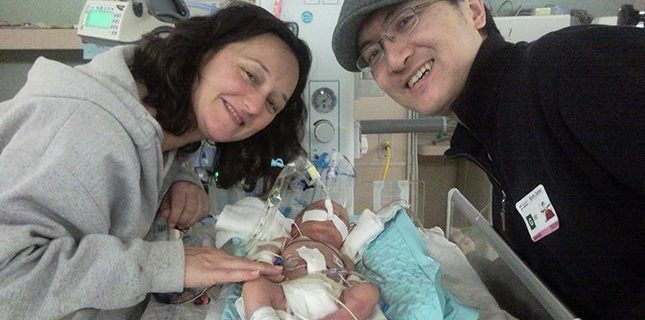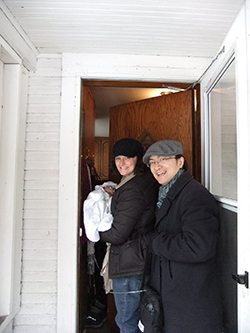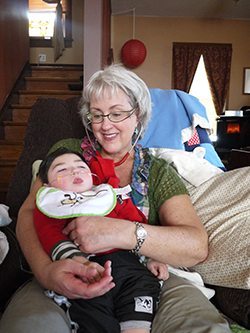Palliative WHAT? Understanding the Team That Keeps My Son Out of the Hospital

While palliative can be a word heard frequently in the medical field, it’s one that is often misunderstood and unnecessarily concerning for parents. Today we invite you to read the first of a series of blogs from Dannell Shu, who writes a blog at MamaShu.org where she contemplates family life within the world of pediatric palliative care. She invites you to follow along.

Walking through our front door with Levi for the first time
My son Levi was born without a heartbeat or breath. He didn’t move or cry. Each moment following was tenuous as he underwent tests, procedures, treatments, and medications while being monitored in every way. We lived in the NICU for three long weeks.
My husband I and nearly fell over when the medical team said the “H” word, Home. It was a moment overflowing with elation and fear.
Soon after we were introduced to the Pediatric Palliative Care Team, who would be responsible for our family’s transition home and our steep learning curve in how to care for Levi as first time parents.
Even among the hospital staff there was much confusion regarding the role and purpose of our Palliative Care Team. Were they a hospice team? Was my son going home to die? Were they medical counselors? There was already too much to understand when it came to navigating Levi’s complex medical care. We could barely comprehend what this Palliative Care Team would do.
A team along for the ride
Little did we know we were being handed a golden opportunity. One that had as much to do with our home being in the Twin Cities metro as the complexities of Levi’s diagnosis and care. At that time, had our home been 30 minutes further from the metro, we would have taken Levi home alone, to fend for ourselves.

Levi spends time with one of his palliative nurses
Today, Levi is 6 years old. We are indebted to our Pediatric Palliative Care Team for helping to make such a miracle happen.They have walked with us from the very first moments at home, through serious illness, hospitalizations, near-death, celebrated birthdays, and built our confidence as the experts of Levi’s needs: medical, physical, spiritual, social, and emotional.
They have made it possible for us to maximize our ability to care for my son at home. To this day he has only been hospitalized twice since the NICU. They have helped us pioneer through the diagnosis of uncertainty and remain centered within our values as a family. They have helped us learn how to “be” a family. Today, thanks to our Palliative Care Team, Levi is a child who is happy, pain free, and thriving at home!
Sharing what I’ve learned
Three years ago, I became a parent advocate within Pediatric Palliative Care. It was then that I realized 1) so few people knew about palliative care 2) how golden our experience continues to be and 3) a family’s access is still limited by where they live. I committed to becoming an advocate who would open doors for other families and change the factors of awareness, access, and education about Pediatric Palliative Care.
In this blog series for PHS, my goal is to help educate your family about Pediatric Palliative Care and share some of the key lessons we have learned through our golden experiences. So let’s begin…
What is Palliative Care?
I have put together a collection of three brief videos. Together they will provide you with a beautiful introduction to an easily misunderstood subject.
This first video is a visual articulation of Palliative Care. It was created by our own Minnesota Network of Hospice and Palliative Care (MNHPC) in collaboration with a national organization, Center to Advance Palliative Care (CAPSI). Take a look and then come back for two more.
(English with option for English captions)
This second video was released in September by the National Institute for Nursing Research (NINR). It speaks specifically to Pediatric Palliative Care. Take a look and come back for one more…
(English with option for English captions)
(English with Spanish captions)
The third video was created by Minnesota’s own Crescent Cove. It begins with an articulation of the general public’s confusion surrounding the question of “What is Palliative Care” and goes on to provide solid answers from experts in Canada and Great Britain.
From these three videos we learn that Pediatric Palliative Care is a holistic, family-centered approach to caring for the physical, emotional, social, and spiritual needs of a child with a complex medical condition. You can get palliative care at any age and any stage of an illness or life limiting condition. Although it draws from the similar values as hospice, palliative care is a unique specialization that provides support for the family to live a values-based quality of life while balancing their child’s medical realities.
Originally published: November 9, 2016

